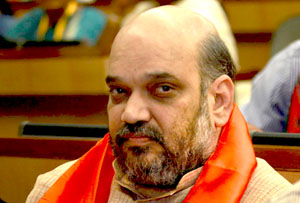New Delhi, July 9: The crowning of Prime Minister Narendra Modi's closest confidant Amit Shah as the new BJP President capped a phenomenal and rapid rise for the party's key election strategist who crafted an unprecedented victory in Uttar Pradesh.
In the process, the controversial yet politically suave Shah, 50, scripted history by becoming the youngest president of the party in which veterans have called the shots since its inception.
Considered an invaluable deputy to any neta, he has taken less than a year to catapult himself from a Gujarat BJP strongman to the party's supremo on the national stage.
Most leaders in the BJP agree that Shah, who was associated with the RSS in his early days, has earned every bit of his success.
What worked eventually in favour of Shah was his extra-ordinary political performance in UP where as BJP's general secretary in-charge he led the party to a dream run wresting 71 of the total 80 Lok Sabha seats in the politically crucial state.
Together with Apna Dal, a new ally which Shah got on board, the BJP won 73 seats in the state leaving a handful for the ruling SP and the Congress in the state.
Shah's organizational skills came in handy for the BJP in bordering Bihar as well where the party forged alliances with the LJP and OBC strongman Upinder Kushwaha to score a staggering 22 alone and 31 out of 40 seats with allies and reducing the state's incumbent JDU government to a virtual naught.
With his master act of scripting LJP leader Ram Vilas Paswan's return to the NDA fold after over a decade since Godhra riots, Shah managed a massive political makeover for his boss Modi, who had long been denounced by Paswan for the 2002 Gujarat riots.
That apart, Shah's poaching of LJP and Kushwaha who had been eager to ally with the Congress, forced political realignments in Bihar with the JDU and Lalu Prasad's RJD coming together to face the BJP's new political challenge.
UP, Bihar and Gujarat put together, Shah's stamp was visible in half of the total number of seats the BJP won in the 16th Lok Sabha elections, driving the party to its best ever performance under the Modi-Shah combine.
Political acumen apart, Shah's controversial past has continued to haunt him until lately. Accused of fake encounters involving Sohrabuddin Sheikh, Tulsi Prajapati among others, Shah spent three months in the Sabarmati jail before he secured bail in 2010.
The bail cleared the hurdles in the way of Shah's imminent rise in the BJP where he enjoys complete trust and backing of Modi. Shah was elevated as BJP's general secretary in-charge of UP where he had less than a year to deliver as LS polls drew near.
He executed his brief to perfection, eventually beating competition within the BJP to emerge as party president ahead of state elections in Haryana and Maharashtra this year and Jharkhand and J&K next year.
Shah's appointment reflects BJP's urge to consolidate its electoral gains further and expand its national footprint.
The BJP leader's rise equally marks a generational shift in the party which is more ready than ever to trust youngsters over veterans.
His elevation follows extensive debate within the RSS on whether to hand over party presidentship to a Gujarati when another Gujarati is head of the Government.
BJP insiders say the decision in favour of Shah was finally taken on grounds that his proximity to Modi would aid better coordination between the Government and the party, further strengthening the saffron surge.
The critics of Shah, who was booked for an alleged hate speech in UP during the poll campaign, is seen by critics as a highly polarizing figure.
That apart, Shah's political skills stand established beyond doubt and he carries the reputation of sticking to his brief and delivering.
Born in Mumbai in 1964, he was elected MLA from Gujarat's Sarkhej in four consecutive elections in 1997, 1998, 2002 and 2007. He later shifted his constituency to Naranpura Assembly seat in 2012.
As the right hand man of the then Gujarat CM Modi, Shah held several key portfolios including Home, where in 2010 he came under attack for allegedly orchestrating a fake police encounter.
Following this charge, Shah had to resign and was arrested though he continued to maintain that he was being witch-hunted by political opponents on the Congress side.
Shah later got bail on the condition that he won't stay in Gujarat. He was allowed to return to Gujarat only in 2012 when he won assembly elections from Naranpura.
Involved with the Rashtriya Swayamsevak Sangh (RSS) since childhood, Shah became RSS volunteer during his college days in Ahmedabad.
His first meeting with Modi happened in 1982 in Ahmedabad RSS circles when Modi was only a RSS pracharak.
Shah later joined the ABVP in 1983, the BJP in 1986 just a year ahead of Modi. Soon with his organizational skills Shah became an activist of Bharatiya Janata Yuva Morcha (BJYM) in 1987 and continued to rise in its hierarchy.
It was in 1995 when the BJP formed its first government in Gujarat under Keshubhai Patel that Modi and Shah together started working to expand party's base in a state where Congress had held sway for years.
Soon Modi replaced Patel as CM and Shah's political career flourished under the tutelage of Modi, whom he is known to fondly call 'saheb'. Shah has graduated with a B.Sc. degree in biochemistry and later worked for his father's PVC pipes business.





Comments
Add new comment